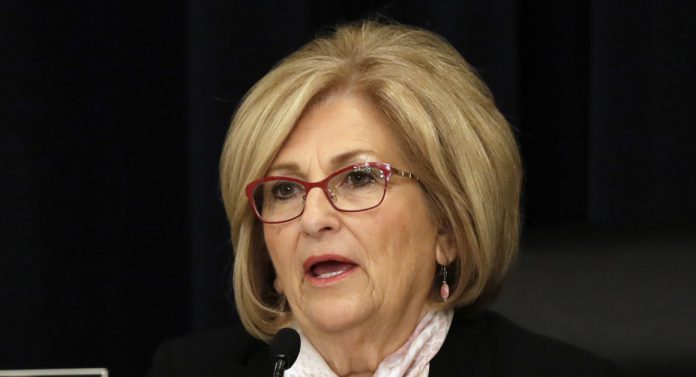
The fractious House Republican Conference is struggling to unite behind a plan to pass through budget and spending bills, divided over policy priorities and basic questions of process.
Lawmakers emerged from your closed-door meeting Wednesday morning with without any consensus on how to proceed. And disagreements start to fester, pitting chairman against chairman and in some cases panel members against one other.
Story Continued Below
“It was throughout the board,” said Rep. Mike Simpson (R-Idaho), who sits for the House Appropriations Committee, upon exiting the meeting.
The stalemate – which focuses on how much to shell out on defense as well as if you should use their Republican majority to reduce mandatory programs like food stamps – has the potential to jam the GOP agenda. If Republicans don’t go with a path forward soon, they can are not ready to pass an affordable in any way.
The budget has long been grounded for months amid internal House spending spats additionally, the Trump administration’s own delay in making an affordable budget.
Eager to push ahead, House budget writers tentatively agreed within a separate meeting Wednesday afternoon to relocate an allowance resolution taking a middle-of-the-road solution to both defense spending as well as the mandatory cuts. May well also trim domestic spending by a few billion dollars.
Members are organizing for just a Budget Committee vote on June 28, though they’re waiting approval from GOP leadership. Lawmakers may also be still fearful their budget could are not able to reach the ground for your second year successively.
Should which happen, GOP leaders can say goodbye for the fast-tracking budget tool they must pass tax reform, which might be considered a huge blow to Capitol Hill Republicans and also the White House.
Speaking to reporters as she exited the meeting, House Budget Committee Chairwoman Diane Black (R-Tenn.) declined to say whether she still hoped to pass the cost before the July Fourth recess, or when she thought your home GOP caucus was inching toward consensus.
“Of course I wish to manage to margin the moment we’re ready. I’m continuing to make good progress,” Black said. “We are responsible for progress.”
That progress was less than evident Wednesday, however. While Speaker Paul Ryan (R-Wis.) wants to say Republicans are experiencing a “family conversation” about how to move forward on major issues, your property Republican Conference is far more equivalent to an estranged family than one that chats over dinner every night.
During the Wednesday conference meeting, defense hawks stood as many as say they desire higher spending levels with the Pentagon and warned about potential problems for military readiness with out a massive spending bump. In which suggested they’d haul in Defense Secretary James Mattis if possible to instruct the conference a lesson in protecting the country.
House Military Chairman Mac Thornberry (R-Texas) is making the situation for that $640 billion Pentagon budget, well above President Donald Trump’s $603 billion budget proposal and substantially on top of the prevailing $549 billion defense spending cap.
Thornberry’s committee is about to mark up its annual defense policy legislation within the subcommittee level immediately including the whole committee level next week. While House Armed Services has become mum around the amount of spending it will outline in its must-pass bill, observers have said they expect Thornberry to press ahead using the $640 billion level.
Budget writers have requested $621 billion for defense, an agreement number they think is sufficient, plus they’re peeved that defense hawks don’t appear to be accepting that middle-ground number.
Some lawmakers and aides, however, say defense hawks usually win the battle between frugality and security – and perhaps they are predicting Thornberry and the crew will again be victorious.
"I think people know the desire for a powerful national defense, and I think what we should will need to look at ‘s what capabilities we either gain or surrender… rather than just talking numbers,” said Rep. Brad Wenstrup (R-Ohio), who sits on Armed Services.
Exiting Wednesday’s meeting, Rep. Duncan Hunter, a California Republican who also sits to the defense panel, said “I think everybody’s pro-$640 [billion], but they’re gonna want things to acquire that."
The thing conservatives want as a swap has grown to be another sticking point: Black have been advocating for countless billions of dollars’ worth of cuts to mandatory programs within her budget, and hard-liners who love that idea say they will potentially support higher defense numbers if welfare programs are reformed and reduced.
But some chairmen, including Agriculture Committee Chairman Mike Conaway (R-Texas), have balked at the idea of producing cuts to programs in their purview. Black has lowered her proposed cuts to mandatory programs from $400 billion to $150 billion, but she’s still getting pushback.
Asked about mandatory cuts under Agriculture, which will likely mean reductions to food stamps and farm subsidies, Conaway seemed peeved that details of Black’s budget had already made it to the press.
“I’m visiting go on to speak to your capacity to purchase Committee you will be eligible her reasonable accommodation with the items they’re looking to get done,” he explained. “Once they put out the statement, I’ll respond officially, nevertheless leaking of data to try to run [ideas] inside the flagpole is not how to run” business.
Even if ever the conference can hash out a on defense numbers and mandatory cuts, it should face divisions over the process, that has been the target within the Wednesday meeting. In reality, GOP lawmakers said they were surprised by how little talk there was clearly about budget numbers, given how little while members have to act.
House Majority Leader Kevin McCarthy (R-Calif.) presented several scenarios to feed appropriations bills with the House, while using objective averting a dreaded stopgap bill this fall. All would involve bundling no less than some spending bills, which means lawmakers have officially ditched the concept of “regular order.”
Some Republicans prefer passing an extensive, partisan spending bill in July regardless if it’ll never remove the Senate where Democratic votes would be needed. That idea, from Rep. Tom Graves (R-Ga.), is meant to provide the rank and file more input, but other appropriators and staff are dreading the proposal and hoping leadership kills it quickly.
There’s concern about time: Will they really write a GOP spending bill in five weeks until the August recess? That timeline hands appropriators necessarily about seven working days arranging the writing and have it to the floor in July.
Some, like appropriator Charlie Dent (R-Pa.), said they did not understand the point since it would never become law.
“Some on the additional options I say is an imitation procedure that would bring about fake bills,” Dent said.
Multiple lawmakers said they be ready to decide on a path forward for the next House GOP meeting on Friday morning. “Hopefully during that time, we’ll have any reading with a consensus,” said Rep. Hal Rogers (R-Ky.), former chairman of your house Appropriations Committee.
Rogers said could possibly “strong sentiment to at the very least receive some within the work done prior to the August break.” That, for the moment, looks like it’s where consensus ends.
















